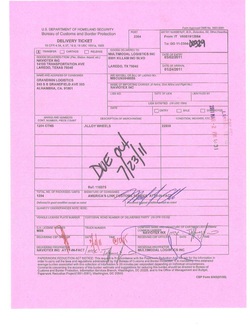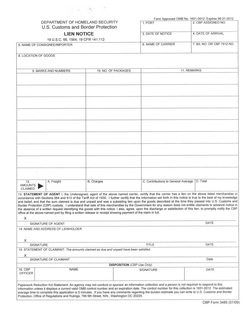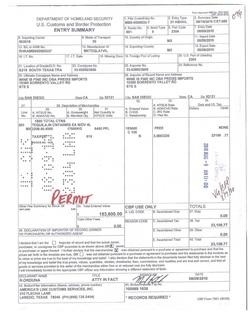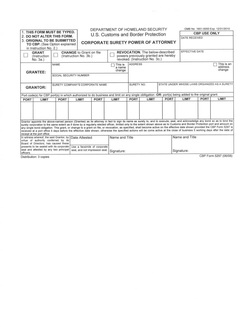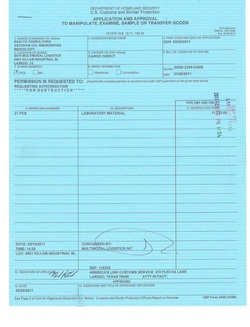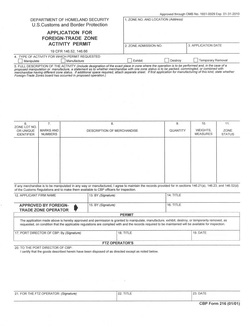Services
- In House Broker
- Bonded Warehouse (G.O.,Warehouse Entry & FTZ)
- Fright Forwarding
- Logistics
- Distribution Service
Forms and Descriptions
- Class 11 Warehouse
US Customs allows merchandise imported under bond to remain in its territory 15 days after it arrives at the port of destination. Shall the merchandise need to stay within the USA past it allotted time a General Order may be filled. Under
a G.O. the goods can stay in a bonded warehouse for up to 6 months from the day of importation.
If after 6 months the goods have not been documented or duties/fees paid, they will be sold at auction, donated to charity or retained by the Government.
- Lien
The right to take and hold or sell the property of a debtor as security or payment for a debt or duty.
- Class 3 Warehouse
Bonded Merchandise can also be stored under a Warehouse Entry. These are several advantages of the Warehouse Entry over G.O. entry.
Goods entered under a Entry type 21 can remain in the bonded warehouse for up to 5 years from the date of importation. Another advantage of the warehouse entry is the ability to make partials withdrawals.
- Power of attorney
A legal instrument authorizing one act as another's attorney or agent.
Class 3 - Entry Type
Record the appropriate entry code by selecting the two-digit code for the type of entry summary being files. The first digit of the code identifies the general category of entry (i.e., consumption = 0, informal = 1, warehouse = 2). The second digit further defines the specific processing type within the entry category. The following codes shall be used:
Consumption Entries
Free and Dutiable 01
Quota/Visa 02
Antidumping/Countervailing Duty(AD/CVD) 03
Appraisement 04
Vessel Repair 05
Foreign Trade Zone Consumption 06
Quota/Visa and AD/CVD combinations 07
Duty Deferral 08
Informal Entries
Free and Dutiable 11
Quota other than textiles 12
Warehouse Entries
Warehouse 21
Re-Warehouse 22
Temporary Importation Bond 23
Trade Fair 24
Permanent Exhibition 25
Foreign Trade Zone Admission 26
Warehouse Withdrawal
For Consumption 31
Quota/Visa 32
AD/CVD 34
Quota/Visa and AD/CVD combinations 38
Government Entries
Defense Contract Management Command (DCMAO NY)
Military Only (P99 files) 51
Note:When the importer of record of emergency war materials in not
a government agency, entry type codes 01,02,03, etc., as appropriate,
are to be used
Transportation Entries
Immediate Transportation 61
Transportation and Exportation 62
Immediate Exportation 63
Automated Broker Interface (ABI) processing requires and ABI status indicator. This indicator must be recorded in the entry code block. It is to be shown for those entry summaries with ABI status only, and must be show in one of the following formats:
ABI/S = ABI statement paid by check or cash.
ABI/A = ABI statement paid via Automated Clearinghouse (ACH)
ABI/P = ABI statement paid on a periodic monthly basis
ABI/N = ABI summary not paid on a statement
Note: Either a slash (/) or hyphen (-) may be used to separate ABI from the indicator (i.e., ABI/S or ABI-S).
A "LIVE" entry is when the entry summary documentation is filed at the time of entry with estimated duties. Warehouse withdrawals are always considered "LIVE" entries. When a "LIVE" entry/entry summary is presented, an additional indicator is required to be shown in the following formats:
ABI/A/L = ABI statement paid via ACH for a "live" entry/entry summary
ABI/N/L = ABI "live" entry/entry summary not paid on statement
"LIVE" or "L" = non-ABI "live" entry/entry summary
Record the appropriate entry code by selecting the two-digit code for the type of entry summary being files. The first digit of the code identifies the general category of entry (i.e., consumption = 0, informal = 1, warehouse = 2). The second digit further defines the specific processing type within the entry category. The following codes shall be used:
Consumption Entries
Free and Dutiable 01
Quota/Visa 02
Antidumping/Countervailing Duty(AD/CVD) 03
Appraisement 04
Vessel Repair 05
Foreign Trade Zone Consumption 06
Quota/Visa and AD/CVD combinations 07
Duty Deferral 08
Informal Entries
Free and Dutiable 11
Quota other than textiles 12
Warehouse Entries
Warehouse 21
Re-Warehouse 22
Temporary Importation Bond 23
Trade Fair 24
Permanent Exhibition 25
Foreign Trade Zone Admission 26
Warehouse Withdrawal
For Consumption 31
Quota/Visa 32
AD/CVD 34
Quota/Visa and AD/CVD combinations 38
Government Entries
Defense Contract Management Command (DCMAO NY)
Military Only (P99 files) 51
Note:When the importer of record of emergency war materials in not
a government agency, entry type codes 01,02,03, etc., as appropriate,
are to be used
Transportation Entries
Immediate Transportation 61
Transportation and Exportation 62
Immediate Exportation 63
Automated Broker Interface (ABI) processing requires and ABI status indicator. This indicator must be recorded in the entry code block. It is to be shown for those entry summaries with ABI status only, and must be show in one of the following formats:
ABI/S = ABI statement paid by check or cash.
ABI/A = ABI statement paid via Automated Clearinghouse (ACH)
ABI/P = ABI statement paid on a periodic monthly basis
ABI/N = ABI summary not paid on a statement
Note: Either a slash (/) or hyphen (-) may be used to separate ABI from the indicator (i.e., ABI/S or ABI-S).
A "LIVE" entry is when the entry summary documentation is filed at the time of entry with estimated duties. Warehouse withdrawals are always considered "LIVE" entries. When a "LIVE" entry/entry summary is presented, an additional indicator is required to be shown in the following formats:
ABI/A/L = ABI statement paid via ACH for a "live" entry/entry summary
ABI/N/L = ABI "live" entry/entry summary not paid on statement
"LIVE" or "L" = non-ABI "live" entry/entry summary
- FTZ
A foreign-trade zone is a designated location in the United States where companies can use special procedures that help encourage U.S. activity and value added – in competition with foreign alternatives – by allowing delayed or reduced duty payments on foreign merchandise, as well as other savings.
Benefits of Utilizing a Foreign Trade Zone
- Made in USA Label
- Ease of Paperwork & Quick Turnaround
- Storage
- International Returns
- Avoidance of Quota Restrictions
- Temporary Removal
- Tax Savings
- Avoid Fines & Penalties
- Export Savings
- Savings on Merchandise Processing Fees (MPFs)
- Direct delivery to your facility
- Not in U.S. Customs Territory
- Savings on consumed, unusable, or not in use materials
- Saving on Non-Material Expenses
- More choice on Duty Rates and Methods
- Under Customs Supervision
- Savings on Fees
- Saving on Machinery Duties
- Reduction on Federal Laws
- Ability to Adjust to Changing Laws
- Better Ability to Complete
- Saving on Distribution
